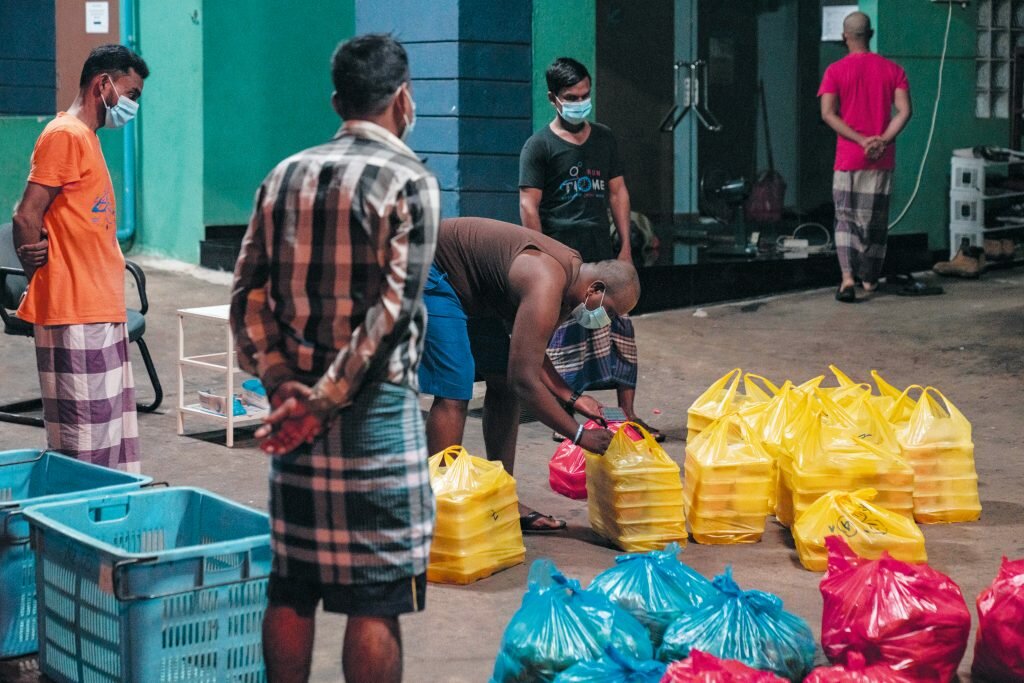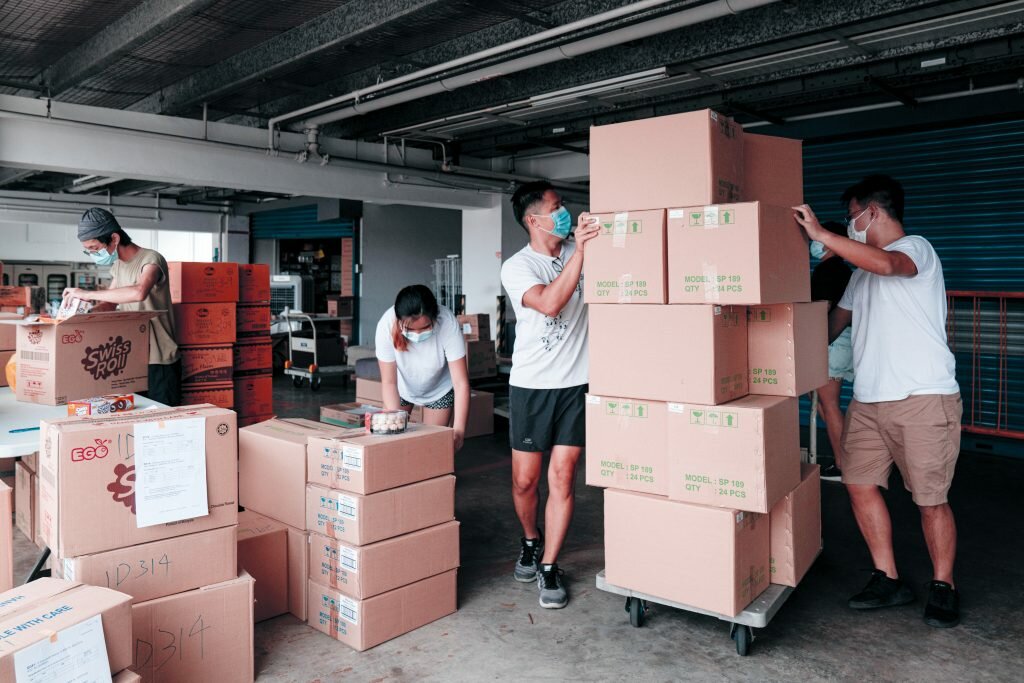The “circuit breaker” has come to an end, but for many, the struggle continues.
Singapore is headed for a bad recession. The economic impact has already been felt; when the government first announced a temporary relief fund for struggling Singaporeans, thousands queued outside social service offices and community centres. Deputy Prime Minister and Finance Minister Heng Swee Keat has since revealed that 450,000 Singaporeans received aid from this fund in April. In a country where poverty isn’t usually visible, it’s a staggering indication of how deeply Covid-19 has cut.
In response, Singaporeans have stepped up. Crowdfunding drives and mutual aid initiatives have sprouted to support struggling families, local businesses, migrant workers, NGOs and volunteer groups.
Zakir Hossain Khokan can attest to the outpouring of care during this period. Since the early days of the outbreak, he’s been working with fellow migrant worker volunteers to coordinate the donation and distribution of essential items to dormitories across the island. They’re doing this through worker-led initiatives One Bag, One Book (originally set up to foster a love of reading among migrant workers) and Migrant Writers of Singapore.
“We received so many donations from local Singaporeans,” he says, rattling off a long list of items from tea and coffee, to books in English and Tamil, to prayer mats for Muslim workers. The support has been so constant, he adds, that he was contacted by donors even while he was hospitalised with Covid-19 — which meant that he continued with coordination efforts from his sickbed.
Apart from donating items and offering their services as packers and drivers, Singaporeans have also opened their wallets. As the government started gazetting dormitories as “isolation areas”, confining tens of thousands of men to their rooms, siblings Subhas and Preeti Nair, along with a small group of their friends, decided to take action by raising funds for NGOs dedicated to helping migrant workers.
They launched the Preetipls x Utopia for Migrant Workers NGOs crowdfunding page. “When the state fails to protect migrant workers, it is our civic duty to act,” Subhas says, while pointing out that this was only meant to be a “short-term buffer” to cope with a much larger, systemic problem.
The response exceeded their expectations; the campaign blew past its $100,000 goal. By the time it closed, they’d raised over $345,000 for the NGOs HealthServe and Transient Workers Count Too (TWC2).
“This fundraiser was a proof of concept almost — that friends can come together, invest their talents and time into something, and actually enact change. We don’t have to wait around for anybody,” Subhas says.
Under the name Utopia, the friends went on to produce the first in a series of videos about issues surrounding migrant worker dormitories in Singapore.
In the middle of the pandemic, with the aid of Google Sheets and Facebook groups supporting local restaurants, a strength has emerged, one that isn’t top-down like so many things in Singapore are. Instead, it’s self-organising and community organising that helps us realise that there are things people can do for one another without waiting for the answers to come from above.
The disruption caused by Covid-19 has brought inequalities to the fore. It’s shown us how safe distancing is a luxury not everyone can afford, how working class people who live from pay cheque to pay cheque are disproportionately bearing the burdens of lockdowns, either because they’ve lost their jobs or are forced to leave the safety of their homes to continue running the essential services that support the rest of us staying at home.
As sociologist Teo You Yenn put it in a blog post: “Pandemic life has thrown into sharp relief what was true all along: for any person, the strength of a plan depends on the conditions in which the plan lives… Now, more than ever, the different conditions of individual lives put distance between those who have and those who do not.”
This should nudge us to rethink some dearly held and deeply entrenched narratives, such as those of meritocracy and self-reliance. Covid-19 has shown that it isn’t enough to be the hardest worker or the smartest student, because we’re all affected by structures that limit (or expand) our options and place us in situations that aren’t merely caused by our own choices.
Once we recognise that these aren’t personal issues but systemic ones, it should also be time to interrogate the idea of charity. Charitable giving is much encouraged in Singapore, and it’s nice when people are willing to donate to others in need. But the concept of charity itself is built on the notion that the struggles of the have-nots are alleviated by the largesse of the haves.
“Charity differentiates those with needs and those with means, and is a hierarchical relationship between the helper, typically belonging to a group with more resources, power and privilege, and the helped, typically belonging to a marginalised segment of society,” says activist Kokila Annamalai.
This hierarchical point of view often leads to patronising or condescending attitudes, built upon stereotypes and misperceptions of those in need. How many times have we heard that people are only poor because they’ve made “poor choices” — the implication being that those with more have made “good choices” and are therefore in a superior position? This opens the door to judgement, inviting responses that aren’t about empathy and understanding, but policing people’s behaviours even though we might ourselves chafe at such a treatment.
If the concept of charity is problematic, what can replace it? Activists working with marginalised communities would suggest solidarity.
Unlike the hierarchical relationship that charity presents, solidarity places the focus on recognising unfair social structures and requires the will to address such injustice. “Charity tends to reinforce unequal power relations between groups, while solidarity seeks to disrupt these power imbalances,” Annamalai says.
Instead of thinking about how marginalised communities can be helped through middle-class sensibilities — consider initiatives that teach financial literacy to low-income families, built upon the notion that they’re poor simply because they don’t know how to manage money — solidarity requires listening to those communities and letting them communicate their needs.
Solidarity also means acknowledging that everyone is a part of the problem and therefore, part of the solution.
“It means having skin in the game,” Subhas says. “It means standing with people who speak up and also those whose voices are silenced.”
For Khokan, solidarity begins with the most fundamental acknowledgement: “The first thing is [that] Singaporeans have to notice that migrant workers are also part of society.”
He adds: “We often hear people saying, ‘Hey, migrant workers are also human beings.’ Why do people [use] this word, ‘also’? Migrant workers are already human beings.”
Such solidarity will bring benefits to Singapore as a whole over the long term. “As human being to human being, we can respect each other, listen to each other, notice each other,” Khokan says. “If this happens in Singapore, it’s a healthy thing for building a healthy Singapore.”


